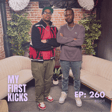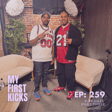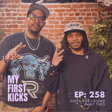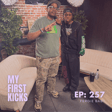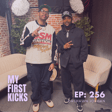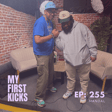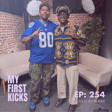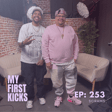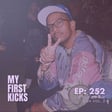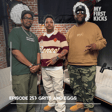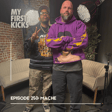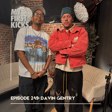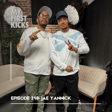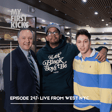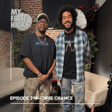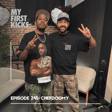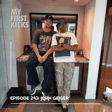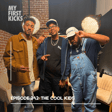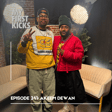Become a Creator today!Start creating today - Share your story with the world!
Start for free
00:00:00
00:00:01

From Hollyhood To The World with Ari
This week we sit down the legend himself Ari Forman, as we talk about his time as a kid in the 80s. We remenicise over his moments as a kid in Los Angeles. How he used to hang out with in Sears and how I also hung out at Sears too. We touch on how his family inspired his art inspirations. How advertising shaped his artistic views and much much more!
Follow Ari:
IG: https://www.instagram.com/Ari
Podcast Linktree: https://linktr.ee/myfirstkicks
Sign up for the Patreon: https://patreon.com/MyFirstKicks
Music by The DoppleGangaz: https://thedoppelgangaz.bandcamp.com/
Recommended
Transcript
Introduction and Homeless Experience
00:00:00
Speaker
A couple of years there where I was homeless with my mom and ah we lived in a couple of spots right near the Sears, so I'll go in there and steal. Yeah. And I got caught stealing jewelry in there and I did the run for it. And they caught me in a parking lot. Let me tell you, these fools caught me. i was running. you know I was juking them. you know I thought I was that guy. And I had a hat turned backwards. yeah It was like a Hawaiian floral pattern hat. It was kind of dope.
00:00:30
Speaker
Like a leather strap back with a gold buckle or something. And I had it backwards. And I'm running. And this motherfucker caught me by grabbing the brim of my hat and pulling pulling me back. Oh my God.
00:00:43
Speaker
What's good, everyone? Welcome back to My First Kicks. This episode 233, and this week I bring to you the OG, my guy, ari Welcome to the podcast, man. Hey, man. Thanks for having me. No, that is a long time coming, man. No worse for wear. It was... pouring outside. Yeah, sorry. Completely.
00:01:01
Speaker
The streets look like rivers. You know, those everybody's seen at this point those videos or are like you know TikTok, YouTube. but two The two train flooding? Just flooding. yeah I mean, it's every time we have a torrential downpour, it's like Dominicans uptown come out with the jet skis and all the hipsters are just taking video in the L train.
00:01:21
Speaker
i still I remember that with the canoe and like Dykeman. Oh yeah, man. They do everything. yeah it up That was crazy. man. theres Anything, because it's sort of like the thing. If you spent any time up in the Heights or in the Bronx, even in Jersey with any Dominicans up there, it's a thing. Like once you get to a certain age, you better have a jet ski.
00:01:39
Speaker
It's sort of like, it's like you got have the car and the house, but the jet ski is the real arrival.
Cultural Insights of NYC and Dominican Influence
00:01:44
Speaker
I want to know. And I've done it. I've been out there with them. No, you haven't. I swear to God. No, you haven't. I have. I wonder how people in NYCHA are like housing these. Like is there, like they just leave it out in the parking lot?
00:01:56
Speaker
I mean, everybody's like everybody's got a cousin, an uncle, an auntie. And so they got a driveway, a garage, and that's how that's working. But I mean, yeah, I mean, you know, you put you put the the car out front, you got to floss with that. right, right. right and you put the jet ski either in the driveway to further floss or put it in the garage and pull it out for the flex.
00:02:17
Speaker
right next to the cloisters just be like yeah we outside listen it's the craziest thing the cloisters man uptown that people if you're not from new york not that i am but i spent the majority of my life here at this point um where All the Dominicans are uptown, yeah sort of like the OG neighborhood and the Bronx. I mean, you can't, there's probably more Dominicans in the Bronx at this point, but next to it is the Cloisters. And for those of you don't know the Cloisters, it's this you know sort of beautiful park.
00:02:45
Speaker
It's up on top of a hill because ah Washington Heights is up in the hills. you know It's on the top end of Harlem. And so there's this beautiful space up there. And randomly, randomly, you walk through that park.
00:02:59
Speaker
you know I don't think they do it anymore, but I remember walking through there randomly. And they had like medieval festival. No, I don't know. On the edge of the hood. Yeah. Yeah. So there's people out there LARPing, you know, running around with fucking turkey legs and pickles and shit and look crazy and like ah chopping each other with swords. and And meanwhile, right here, it's, you know, everything you could possibly imagine about the hood. Yeah. um In the best of ways.
00:03:24
Speaker
Like it's right off of like, it's right near, I guess, right near Dykeman. Yeah, it's right next to that. Yeah, I mean, um but for people, if people are not familiar with you, how about your you introduce yourself? Oh, yeah.
Ari's Background and TV Shows Discussion
00:03:34
Speaker
I'm Ari Sale Foreman. not ah Contrary to Pavia, believe it's not Saul. I thought it was Saul too. sal ah you No, that that would be extra Jewish, I guess. right Saul. it's Saul. that's You know, like, ah you know, TV show. Yes. ah Better call Saul.
00:03:51
Speaker
Yeah, but wasn't that based on an original? on a but What's the name? Breaking Bad? Breaking Bad. Yeah, yeah. He's from that? Yeah. and I'm the one dude that didn't watch Breaking Bad. I was in Jamaica, hu the country, not Queens.
00:04:03
Speaker
I was in Jamaica, the country, when they had this the finale. Uh-huh. And everybody was like rushing to find a TV because there was no link up. You know what I mean? So they found one bar that had a satellite. And everybody's watching it. And, you know, any show, the the final episode is always trash.
00:04:21
Speaker
And I'm sure it was too because it certainly didn't seem exciting. I had no context. I thought it was a great ah finish. It might have been, but I don't ah and um um know why I didn't watch that show. It kind of... i What was the but was the one down in Baltimore?
00:04:36
Speaker
Oh, The Wire? The Wire, man. I'm just going through that right now. Oh, man. yeah That's good stuff. Yeah, I started from the beginning because I only watch... i'm like I feel like I'm like one of the people that picked up The Wire at the same time everybody else picked up The Wire, but they didn't want to go back.
00:04:50
Speaker
So it's like from ah season nine, maybe, or whatever, when they started introducing Marlo and stuff like that. like That's when I started picking it up and going... like I feel like that's the one that gets the... That part is the one...
00:05:02
Speaker
That part of like before it ends is where everybody picked it up was like, yeah, you talk about The Wire. I don't remember nothing about these like first four seasons I'm watching. Well, you know, the first season is always of any show.
00:05:13
Speaker
It's good. It's great if you're watching it then. but when you go back, and you see how crude it is and how the characters haven't really developed. And yeah some people even have different voices. Like they, you know, they went from... Especially Idris.
00:05:24
Speaker
Oh, yeah. Well... I mean, it's that's true for a lot of people, though. I mean, you kind of in a show like that, you find what your typecast is going to be. Yeah. Find out who you're going to be for the rest of your career.
00:05:36
Speaker
For sure. And it took him a while to beat that. That's a it's a one of one type of a show. There's a lot of things that like it before and after, it but there's it's really one of one. What was that other one?
00:05:49
Speaker
It wasn't as popular. i forget Snowfall.
Philadelphia's Cultural and Historical Reflections
00:05:53
Speaker
Snowfall. I feel like Snowfall was pretty popular. It was pretty. Yeah. I mean, it's weird because the wire, there was only five networks or whatever. Snowfall has come in the midst of streaming.
00:06:03
Speaker
And it's it's pretty accurate. I mean, I really remember that era, that crack era very well. especially like this sort of micro blocks where people were the the the fiends would come out you know the crackheads would come out and the dealers were and you know my friends are out there and watching people's parents fall into into that hole of crack and geez and like is yeah there was things where people were selling crack and their parents were smoking crack it was it was a wild time where where'd you live during that time in philly in g-town yeah
00:06:34
Speaker
And I mean, Philly's still in the 80s in many ways. Yeah. It's weird. it almost it almost for a moment had some real momentum. But I think that's what makes Philly so incredible talent-wise. Yeah.
00:06:48
Speaker
um And it's not a gigantic talent pool, but it's concentrated. So if you look at it per capita, the the type of artists, you know the soul yeah that city is really unparalleled.
00:07:00
Speaker
And I'm not saying that because I'm biased. um It really just is. I mean, like the fifth or sixth largest city. and And it's really the last city once you pass the south.
00:07:12
Speaker
yeah The first city, rather. it the last It's the lowest city of the north, the first city of the north. Yeah. But in many ways, in New York where people's, a lot of people's roots here touch the Caribbean.
00:07:25
Speaker
And they don't really have callbacks to the South the same way like in Philly. People, their family reunions are in the South still lot of people. Really? So Philly, it's it's ah it's kind of like the Galapagos Islands. really has developed isolated And people in Philly tend to not leave it. yeah there's The only reason that I left Philly was because i even my entire family was born in Philly. yeah My mother was pregnant with me and moved to Oakland to be a hippie. And I was born.
00:07:53
Speaker
And so it was like an eventual return to what is home for our family. But I think coming to Philly and spending my formative years there, but having been from Oakland and l L.A., really l L.A.,
00:08:06
Speaker
It allowed me sort of like the mindset to be able to go, you know what? It's time to go. Yeah. And, but honestly, i don't think other than that, I don't think I probably wouldn't have left because almost everybody I know has not left and they're not going to.
00:08:19
Speaker
i Well, I wanted to touch on what you said about how the roots the southern roots made it to Philly. I always thought that ah the Harlem Renaissance. you'd say Are you saying that like, I feel like the Harlem Renaissance create like everybody moved up yeah from there. Are you saying people from Harlem moved to Philly?
00:08:39
Speaker
No, no, no, no. they Nobody went south. I'm saying like people in the south. you know during some talk I'm thinking more more like, all right, we're coming up. And to me it's like, okay, Harlem Renaissance. Oh, you got stuck there. you stopped there? Yeah. I've never heard about the like, oh, we went to Philly, right? Like part of it. Oh, well, again, guess. From the South. To be clear, and I know this is getting way off track here. It's fine. I love history.
00:09:05
Speaker
I mean, really, ah the way it was the big city yeah that had the freedom for black folk kind coming out of segregated South, because even with, um you know, this is long before the end of segregation, yeah but it was a free city to the North yeah comparatively. Now, that doesn't mean it isn't segregated and racist in its own ways, but for the most part, it's a much more integrated And liberal city compared to, you know, what was happening in the South, especially um with Jim Crow still in place. And then once even segregation broke down, in it Philly didn't skip a beat. It was, there's a lot of lot of stories, lot of bad stories in Philly, lot of racism, a lot of bad politics. Right.
00:09:46
Speaker
um It was still freedom comparatively. And if you look at other immigrant communities, you know, there's a huge Irish community, Italians very deep there. And those people were ostracized, certainly not comparatively to black folk. Right. You know, they they went through their, you know, their struggles the way that, you know, the classic Protestants would.
00:10:07
Speaker
have always punished the Catholics. yeah and And then when I was a kid, by the time I got to Philly, the Irish and the Italians were fighting. They're fighting in the streets. It was pretty wild. so But even still, it wasn't the South. yeah It wasn't the South. And it didn't have that, um they weren't Confederates. yeah you know So it's a you know I guess in America, you have to choose your yeah type of racism that you're willing to tolerate.
00:10:32
Speaker
um and that was better. So Philly, it's just weird. it It really is this sort of gateway city and it's massive. you know It's a million and a half ah people. So that's, yeah, a million and a half.
00:10:43
Speaker
And the there's just it it's a working class town. You got sports. You got your job back in the day, you know, your factory job, your union job, and you got a ah little row home, you know, like the things we were talking about in Baltimore and the wire, it's the same development, you know, ah Baltimore and Philly share a lot of the same parallel and certainly architecturally and texturally, but Baltimore was more, you know, on the ocean and Philly's up the river.
00:11:10
Speaker
Yeah. um And so yeah, you really could just be a real working class family. And that's really what it is, is a working class town. And no matter how they try to dress it up, no matter how much they try to class it up or or develop something that looks sexy, it just never really works. People go out to one of the richest neighborhoods in the country, which is the main line, which is you know right right on the edge of the city, a little bit out, like 10 minutes out. yeah um And so I think all that pressure, you know not to be cliche, created all these diamonds. And
00:11:40
Speaker
you know, you see that peak. There's plenty of moments in Philly history, music and art and and and dance and and and food especially. um But you look at that moment of Philly International with Gamble and Huff.
00:11:53
Speaker
Yeah. And you see what those guys were doing. And that, I think that was probably the first, modern you know a look at how incredibly talented Philly is and then you go from that you you know neo soul and hip-hop and right I mean you can't I mean look at the roots yeah I know he just listening to their roots as they as they originally called yeah busking on the corner um I just listened to a recent interview request love on there and um it's like Yeah, I do. I do just like, you know, Philly doesn't get enough love, um even though it's the city of brotherly love.
00:12:29
Speaker
Oh, well. At one time, I'm sure. Yeah. um But to pivot into my question that I've been wanting to ask you for a hot minute, which is, what's your first kicks with that first pair of sneakers you
Sneaker Memories and Retail Nostalgia
00:12:39
Speaker
absolutely needed ask? How the hell does that segue into that? That was terrible. It is. was terrible segue. It cut. We've got to rework that. Nah. Yeah.
00:12:49
Speaker
I took you astray onto this crazy thing. It's all good. And the first pair of kicks, I wish I could say it happened in Philly. you know I really am a Philly person. um And you know born in Oakland, but raised in LA until I was 12. Everybody's heard this, but um then from age 12 age 24 Philly, which a to age twenty four in philly was also a really those are really the years that formed who I was going to be as an adult. i yeah
00:13:20
Speaker
And I really wish that the story of my, of the first pair of kicks I had to have came from Philly. Yeah. It just doesn't. And, uh, I really wonder what that would have been by the time I got there. It was, there was all kinds of classic things kind of happening kicks wise. Um,
00:13:37
Speaker
But I showed up, I literally showed up in in Philly with pair of vans on. Not to be the cliche California boy, but... Were they slip-ons?
00:13:48
Speaker
yeah they were Yeah, they were. They were. They might've been checkered slip-ons. Might've been that cliche. i mean, it was 82, right? So that's like ground zero for that moment in time. But my my first pair, I remember ah remember like Sears. you know and some people Some of you might remember Sears. it's If you don't ah dive down that thing, it's it's imagine if Amazon was physical.
00:14:12
Speaker
If Amazon was a physical place yeah and you take that and combine it with like Zappos and you know, it really, there's no internet of course. mean, I means used to hang out in a series almost every day.
00:14:26
Speaker
You're that old? Yeah, I am. Damn, Jesus. Aging well, my friend. Thank you. Shout out to the to the Sears on Queens Boulevard. Oh, that had to be great. Queens Boulevard?
00:14:39
Speaker
That was my jam, bro. Damn. You hit up the Red Lobster that was also on Queens Boulevard or the Sizzler, which was on the corner. Oh, Sizzler too? And then you're done. I'd drag my mom and be like, can we go to Sears? And then I'd play on the GameCube over there. Because I didn't have one. I mean, not GameCube. The Game Boy.
00:14:58
Speaker
The one that you was attached to the to the stand or whatever. You play the Game Boy because I didn't have all the games or whatever. Yeah, it was fun. Did you get on the bike on there? yeah, yeah. Damn, I don't think I remember any interactive stuff.
00:15:10
Speaker
i like you know I was in LA. I was in Hollywood on the flatlands. I didn't live in the hills. you know Hills are nice, but flatlands, you know the streets, that's something else. But we had one right down. is like all It was a Mexican neighborhood that I'm sure was some kind of like working class or middle class white neighborhood in the early days of Hollywood. But Hollywood has been Hollywood for decades. yeah um And there was this big ass sears down there.
00:15:37
Speaker
And whether my parents were taking me or whatever, there was like A couple of years there where I was homeless with my mom and ah we lived in a couple of spots right near the Sears. So I'll go in there and steal. Yeah.
00:15:48
Speaker
And I got caught stealing jewelry in there. And ah I did the run for it. And they caught me in a parking lot. Let me tell you, these fools caught me. i was running.
00:16:00
Speaker
you I was juking them. I thought I was that guy. And I had a hat turned backwards. It was like a Hawaiian floral pattern hat. It was kind of dope. let thinking back like ah Like a leather strap back with the gold buckle or something. And I had it backwards.
00:16:15
Speaker
And I'm running. And this motherfucker caught me by grabbing the brim of my hat and pulling pulling me back. Oh my God. Yo, thank you for tapping into this episode with Ari. And what do we say, Andy? Don't forget to like, comment, and subscribe. And be sure to tap into my man Haas' Patreon.
00:16:29
Speaker
You heard Andy, patreon.com slash myfirstkicks. If you want to check out some exclusive stuff, we got two tiers, $3, $5. If you want this exclusive stuff, as you'll see, what I'm going to be teasing probably at the end of this episode or maybe on the on the YouTube, you'll see some of this trip from Oregon, portraitr ah Portland. Wow, Portland. Portland.
00:16:51
Speaker
um And back to the episode. Bleh. Come in. know, I was a kid. He was an adult. He was going to catch me anyways. yeah that was embarrassing. you Thank God it wasn't the days of, like, you know, the camera phones. yeah that baby You would end up on America's Funniest Home Videos. And he drugged me in there. And, you know fortunately, they didn't get the cops involved. They called my mom. And we played it up like, ah.
00:17:20
Speaker
i didn't know But I had been in there stealing so many times. I used to steal Star Wars figures in in the 70s. And this was probably- Damn, if you held on to those now, you would have. I mean, I know you got those dire circumstances. trying to hold on to your health when you're homeless. Yeah, yeah, for sure. You're not really trying to hold on to Star Wars figures.
00:17:36
Speaker
But, you know, there's a lot of things that I wish I held on to. I see friends of mine who have stuff from their childhood. I'm like, fuck you. Nah, yeah, same. I think I threw away too much stuff. But again, i'm
Artistic Journey and Creative Challenges
00:17:49
Speaker
dragging in other places. That Sears is the scene of the crime. yeah to the the first to Not the first pair, but it I think Vans wasn't in there. Back when I was a kid, um Vans were in their own stores and they were called Van Doren stores. They weren't Vans.
00:18:04
Speaker
It was Van Doren was the family name. And Vans were that style of shoe that we now call Vans. It was like Van Doren's Vans. you know And they had other types of shoes. You would go into their stores and they just had a wall full of stuff.
00:18:17
Speaker
um But I saw the early skaters and you know the surfers. Did you run with the dog the dog towns? I did. I did. My first my first skateboard in, I think it was 78, was a dog town.
00:18:31
Speaker
I had like a you know like a little fiberglass joint. yeah you know And that John was like- That's the one with the big tail at the back end, right? No, no, no. This was the skinny Johns. Okay. They had the big urethene wheels and the tiny little trucks. Yeah, yeah, yeah.
00:18:44
Speaker
and ah But that's ah that was kind of at that cusp when they were sort of transitioning out of those slalom freestyle type dudes. And you know like the classic long-haired, blonde surfer-looking dude. It almost was like a ah ah layover of the 60s. And they were starting to get into that. Yeah, the Christian Hasoy.
00:19:05
Speaker
No, i was he was even after. he was He's from that era, Dogtown set the stage. Okay. And then out of Dogtown, sort of like there was Alva, Tony Yeah, Tony Alva. And then Josue and these guys. They're all, I mean, everybody was there. Yeah. But- Josoi is an 80s story or Dogtown is a 70s story that went into the 80s, so to speak. you know they were they There really wouldn't be most of the things we know if there wasn't Dogtown.
00:19:32
Speaker
yeah um And for those that don't know, Dogtown was the hood down in Santa Monica, which is like when you go to the pier and it's very touristy, it's sort of like old Times Square versus new Times Square. yeah yeah and um But Dogtown produced incredible talent, man. Super legends. Talk about another... yeah you know Something about that pressure, man, and poverty will create something that nothing else can.
00:19:56
Speaker
it's a I don't know if it's worth the price. It's great for society or for the world. Right. the individuals, you know, i think that kind of stress takes a lot of years off your life. for sure. On the back end, you know?
00:20:10
Speaker
If you survive it. Yeah, that's what saying. was about to say, a lot of a lot of these people that are part of that just, like, did not make it past, like, certain ages, so, yeah. no you know, i'm I'm definitely suffering from PTSD and stuff. might not seem like it, but, yeah, I'm ah i'm under some stress. Yeah. Some physical stress. Yeah.
00:20:28
Speaker
But, I've accumulated way more stories than most of people I know. h Unless they're, you know, crazy motherfuckers like me. And then, but um so the van stores,
00:20:41
Speaker
um I didn't really know about them because in Hollywood, Hollywood is is interesting because I think most people nowadays, you know we have all the we have social media. We really just have the means. The internet has shown us what Hollywood's like and people kind of avoid Hollywood. It's kind of like you know the term used in New York is like bridge and tunnel or something. It's sort of like people coming from other hoods to come party in this generic centralized place. Mm-hmm.
00:21:08
Speaker
But Hollywood has just been, you know i guess at this point, since the 50s, it's been Mexican. you know And with pockets of white and there's a black neighborhood. The original Roscoe's, when you think the chicken and waffles, the original Roscoe's is in Hollywood. yeah It's not the one down on Pico that's down on the edge of the hood there. yeah It's the one in Hollywood. Yeah, I went to that one for my first time going to L.A.
00:21:34
Speaker
that That was like the second meal. Oh, Gower. Yeah. Right there. Right off sunset. There's like a sex store like three three blocks down or something like that. Probably one next door you don't know about. There's this weird little strip mall with the liquor stores and it's like two story. probably massage parlor up above that or something. For sure. Gotta be.
00:21:52
Speaker
But you know was it was this sort of thing that Hollywood was and still is in many ways. It's just as much as it's gentrified or cleaned up like other places, it's just held that grit. yeah There's a lot of Mexicans down there that got in on really cheap ownership and they're still there, man. They're still there. Thank God they're still there. Yeah. Because otherwise it would...
00:22:15
Speaker
I don't know. It'd probably start to look like New Jersey, you know, like a suburb. I'm not disparaging New Jersey. Um, I'll disparage New Jersey. Listen, man, like when you live in Philly and you live in New York, it becomes like a sport that disparage New Jersey. But in all fairness, um,
00:22:32
Speaker
landscape wise and what it offers might be one of the most diverse states in the country. It's a huge state. It's huge in it and it it goes from cities to rivers to oceans yeah um to mountains to farmland.
00:22:49
Speaker
i mean they got everything. I mean there's people just there's crazy crackers down there with confederate flags. Yeah it's crazy. I mean this you know these are crazy times. i I'm curious so like You know, start, like, at a young age, obviously, that you've witnessed the West Coast, yeah and then you carry that over into the East Coast.
00:23:09
Speaker
But, like, what, like, was there inspiration to start art at that early age, or... Well, I mean, it's, it's all, it's all part of it. I mean, the skating, you know, we think about, you know, my first pair of kicks and and skateboarding.
00:23:24
Speaker
Um, my mother, my mother meant, you know, God rest her soul. She, uh,
00:23:33
Speaker
By the, again, I was the last child to be born. So in that way I was kind of spoiled. I think my oldest brother, he's, he, God bless his soul too. He's gone too, but he, he had it hard. Yeah.
00:23:46
Speaker
And I think he paid a price so that I could be creative. And my mom had wanted this to her first husband was, you know, this really sort of oppressive Catholic dude.
00:23:58
Speaker
And he, um, they They had it rough and they were you know getting their asses beat in the projects. And um you know by the time my mother met my father, my father was in a position where you know he was a softy.
00:24:12
Speaker
He wasn't a tough guy and my mom could really just wear the pants in the relationship, so to speak. And he was able to give us just enough for me to just be creative.
00:24:24
Speaker
And so my mom was always coloring and making like decoupage with me. and We would make candles and tie dye, of course, you know, it's that, that time of life. Yeah. Yeah. At time ah ah in the, ah in history and coloring books and you name it, just like anything. And my mom instilled this, this beautiful,
00:24:45
Speaker
quality. I mean, there was, she came from a lot of dysfunction, a lot of problems, and she created a lot of problems in us and put us through a lot of stuff. But, um, that, that one really strong gift, that creativity, i was the only one to really get it.
00:25:00
Speaker
Yeah. My siblings experienced it, but I was the one that my mom could really focus on. And so, um, that's, you know, that, art, crafts, anything. It really was just imagining, imagining anything and trying to create it.
00:25:18
Speaker
And I mean, as a kid, I was trying to, mean, I think all kids are crazy that way, but I really believed that I could create things. And at some point, I guess that's supposed to go away or at least it's not supposed to, but society strips it away. Interesting. And they beat you with responsibility. And especially me coming from the situation that I was in, in that transition of moving from my mother's life to my father's life. Yeah.
00:25:44
Speaker
Um, that should have been there, but fortunately my father was kooky and weird enough that he encouraged it too. So I kept thinking, crazy.
00:25:55
Speaker
And, you know, I mean, it's the only reason you know me is because yeah I dared to do what wasn't supposed to be done and yeah in some ways. And it wasn't like people hadn't done it.
00:26:06
Speaker
I just was some asshole that was gonna do it in some other extreme way. And yeah that creative, Vans, coming back to my you know my first pair of kicks, coming full circle, seeing these cats in Hollywood on the streets, skating, and you know going to skate parks, going down to the beach, Vans was in the it was in the valley. Yeah.
00:26:28
Speaker
you know hollywood l LA is sort of separated by these hills. And um you cross over those Hollywood hills. you know People know the picture of the classic Hollywood sign. When cross over those hills, you go into the valley. right Not where the Hollywood sign is, but in general, I'm saying. You go into the valley.
00:26:45
Speaker
And the San Fernando Valley um was, in many ways, kind of like Jersey. I think you know because you know Jersey City and Newark, and but then it's mostly suburban. It really had has grit.
00:26:57
Speaker
it has ah It was a complete suburban life. So once the car showed up, people drove over the hill and went into the valley. So it became the white flight area. Mm-hmm. And it's sprawling with malls and strip malls and Hollywood was is old, you know, it goes back to the studios.
00:27:14
Speaker
So there's a lot of Hollywood that was that became mid-century, but a lot of it old, you know, 20s, 30s, 40s. And so that's where all that was happening. And Van Doren, you know, the factories and stuff, everything was not in the Hollywood area. Hollywood would be like Manhattan, yeah you know, and again,
00:27:33
Speaker
the Valley was like Jersey. So I wasn't exposed to the stores. So originally we would go to Sears yeah and get sneakers. And in Sears, it was like in in that era, The shoes were, i I vividly, vividly remember this, um that they were doing these beautiful, solid color shoes, sneakers, and they all had the Cortez shape.
00:27:57
Speaker
Oh, yeah. But Nike isn't the inventor of the Cortez shape, you know? And that's, again, you know me, I'll disparage Nike all day, but yeah it's not disparaging. It's just... The way it worked then is either everybody had the the first sneakers like the Chuck Taylor. right And it was a PF Flyer and you know and Keds and everybody had a version of that. Yeah, a version of that. That next version was that nylon and s suede Cortez looking type thing, which was this running shoe.
00:28:23
Speaker
was like the the athletic shoe. ah For Nike, it was like this waffle thing. The waffle, yeah. you know For Adidas and everybody else, it was this ridged sort of like almost Vibram looking kind of soul. And yeah so there's this I remember going in there, it was beautiful solid red and beautiful solid green and beautiful solid blue.
00:28:41
Speaker
And they all looked in that shape. It didn't matter, Adidas, Nike, they were all kind of new brands to most people then, as brand names as it were. And so I remember buying, think it was Adidas there, but that wasn't, remember the colors hitting me, but it really wasn't the first pair I needed to have. yeah It wasn't until I saw them dudes, you know?
00:29:04
Speaker
um those dudes that were in the streets with the vans skaters and you know a lot of the skaters there were skaters that were suburban dudes you know they were and then there was the like dogtown dudes who were just like gritty as fuck yeah yeah and vans had the presence of mind to make a shoe that they sort of targeted at skaters they didn't you know i think that classic vans era um which is also called the authentic yeah the same one has a collar lining and one doesn't yeah um that model there i have ads that go back to the 50s uh of converse with that same silhouette yeah so again here's the the common silhouettes happening around right yeah um but vans
00:29:50
Speaker
much like most companies is they put their twist on it. And more importantly, they use different materials. And when I saw, this was before, I think it was before the checkerboard. um I think so.
00:30:03
Speaker
Yeah, it was. It was probably right before the checkerboard. You would go to the Van Doren store. yeah and to And you could buy off the shelf, you know, off the rack. But you would go to the Van Doren store and you could custom make your entire shoe. This is before Nike ID or Byme or whatever. Oh man, you have no idea how dope it was.
00:30:19
Speaker
So let's say you take, there's no sneakers around here, but um if you took the classic Vans yeah and it's pretty much three panels, right? Like you have like the vamp here and then you have the side and then you have like the heel cap or whatever. Yeah. um sort of different names for these things. But let's say there's three panels.
00:30:36
Speaker
You could go into the Van Doren store and they'd pull out a ah sheet of paper that was sort of like your order form. yeah And you would look at this, you know, sort of like a coloring book of of like, you've seen people do with air Force Ones and stuff. yeah You're nerding out or whatever. um Hopefully most of you didn't do that, but some of us did.
00:30:54
Speaker
um And there would be these these three sections and you would go through they id have these... books of swatches of color. like i think they're on rings maybe, I don't remember. They were just- Pantone?
00:31:05
Speaker
No, no, no, no, not the materials. So it would be like denim and this. So would be the patterns, the textures. Similar to when you go to Nike Lab and 21 Mercer and then you did the whole- 40 years later.
00:31:20
Speaker
And for them, because the factory's right there, it's American made. and For them, it was there was money to be made there because they could just take you know these orders and have one, brain i have you know whatever, how many, 10 people making them down the road there.
00:31:34
Speaker
But you would go in and you would say, okay, i want this first panel, the the front of the shoe gold color, meaning like a a yellow, like a deep yellow. Then I want this one blue, the the middle blue, and then want the back red.
00:31:46
Speaker
And then the other shoe you could do completely different. And that was, you know even Nike hasn't done that as far as I know. yeah They haven't allowed you to customize each shoe. Which, I mean, if they're not doing at this point, they're just waiting for somebody to do it for them.
00:32:00
Speaker
I mean, it's just stupid. And so I would get mismatch, you know? And the mismatch would be like, I would get, and I have a picture of me wearing these slip-ons with red, black and red, and then black, red and black, completely mismatch.
00:32:18
Speaker
And i you know, as you're eight years old, like, yeah, you know you're a rebel at that point. yeah But it was the excitement of the creative process yeah of sitting down there and looking at the drawing of a shoe and playing with the colors and looking at, oh, I'm gonna get a Hawaiian pattern, you know floral pattern. Oh, I'm gonna get checkers. I'm gonna get, you can mix it all up and you know pay for it. And they'd call you and you know whatever it was.
00:32:42
Speaker
Seemed like forever to me, it was probably ah two weeks or something. And you would get it and that was just, I mean, there's nothing like it still. yeah And I think anybody that ah that dreams of making a shoe, all these guys that have done bootleg shoes and parodies of parodies and parodies of my parody.
00:33:02
Speaker
um I think that's ultimately what it is. It's just satiating this childlike thing about you that wants to create what you make. I mean, look to this day, I mean, I make my belts, right? oh And I, you know, me, I wear tons of ah RL and Brooks Brothers, yeah you know, classic, I buy the 80s stuff and the 90s stuff and American made you know.
00:33:26
Speaker
I have a whole collection of things and it's not like low life type stuff. It's just a lot of it's old man type stuff, but the belts, man, just don't like the belts. So I started making my own belts. I can sew in a straight line so I can make a belt, right?
00:33:38
Speaker
Yeah, sure. Get a better machine, be able to sew leather, straight line. It's not like I got to cut patterns and make a shirt. So- yeah um you know That process is like... i think i think I do think it's just like, i just want I want to know where your creativeness comes from.
00:33:52
Speaker
My mother, that's it. Encouraging imagination. yeah If you're lucky, you know I didn't get a hell of a lot from my mother in that way. um and again, it's not to disparage her, it's just being real. yeah and I'd be real to her face, and I always was.
00:34:07
Speaker
But that creativity came from her push to not lose... that skill. yeah And most kids is grow the fuck up, get responsible. And it's true. you know Get your job, focus. Don't you want to think about your future? Well,
00:34:26
Speaker
you know, more and more, especially in this modern era with AI and, you know, it's not enough to just have a skill. yeah Because you know, certain skills are forever skills. For sure. And some skills aren't.
00:34:37
Speaker
And certain, crazy enough is the thing, you know, we thought the robots would replace the working man a lot quicker than it happened than it's happening. But what AI is doing is replacing a lot of college grads. Yeah, that's crazy. You know, a lot of people who are programmers. Yeah. Which is a terrifying thing because, you know, these people were like rocket scientists to us, you know, who were artists comparatively. But now it's like a dual major.
00:35:00
Speaker
Yeah. it's ah We're on an interesting path. Yeah. You know, I'm like, I'm super big. I'm super big anti-AI art big time. Oh, I mean, it's not. um and Dude, do you can't.
00:35:12
Speaker
You can't. I don't know. I don't want to disparage anybody. I'm just, I'm not that dude. You know what I mean? But I but i wanted to i wanted to know. So like, as you as you get older, right? So, you know, you're pursuing art.
00:35:28
Speaker
Yeah. Right. In like high school. While like, are you still being yourself? Are you, like, are is people pushing back on you? Like, are you a tastemaker? Are you making waves? Like,
00:35:39
Speaker
You know, because, you know, we we know where you are now. We know what you've done. But I've always been curious about, like, how did we how did how did you continue to continue to pursue that?
00:35:53
Speaker
Dysfunction. Yeah. i think I think that's probably, I mean, it's it's the gift and the curse. I don't possess any practical nature. you know And as as I have recently reminded people that are very important to me in my life,
00:36:11
Speaker
And they look at me and they're envious and I look at them and I'm envious. And I think that's what we bring into each other's lives is that and the people who, like my father, who are just practical people.
00:36:27
Speaker
And in some ways I'm horrified by the prospect, yeah but I'm, I'm jealous that I missed that, that gene, you know, ah that I just didn't grow up. And I, I think, you know, it's something that you see in New York in particular, you know, which is a city built on immigration. Yeah.
00:36:44
Speaker
Um, and how important the immigrant is, the Italian immigrant, the Irish immigrant, the Chinese immigrant, um, and you know the contribution of of black folk by sheer force um has made a city that has ah people, ah different groups of people that so different, but with a common thing, which is this tenacity and discipline to be practical and make it.
00:37:10
Speaker
And I'm the byproduct of hippie parents. So nothing practical about that. yeah that's a and I'm Gen X, but um you know it took the boomers to sort of create whatever the fuck we are.
00:37:24
Speaker
um And but um i think most of us ended up practical, yeah but a lot of us ended up pretty fucked up and dysfunctional. And for me, I think just the sheer desire to create things yeah has literally forced me forward into surviving.
00:37:41
Speaker
the So, i I mean, I've mentioned this to you several times. You are one of my biggest inspirations into, thank you man into you know, doing design. That shows you that he's dysfunctional too, if I'm his inspiration. inspiration um i ah you know, finding your stuff super early on, just like when I was studying art and like trying to figure out how to become a graphic designer, your your art was the first things.
00:38:06
Speaker
And then I found the menthols. But like, I've mentioned this to you before. Oh, like magazine stuff? Yeah. yeah so And so like the... Man, you should see what you've never seen. gotta. It's endless. I gotta some more. I don't share most of my shit in the world. You know that But I want to know, how'd you get to that point? I want to know, like, how'd you get to the point where...
00:38:24
Speaker
Where graphic design wasn't a thing. Like we'd have, we have artists, we have like painters, you'd pop art. We went crazy for a little bit, you know, but like, you know, well, thank God for that. Yeah, for sure. So like, how did you find your, your way in that space? Especially when it was just like, not really like early adopters were really i'm still finding my way in that space. You know, it does late age, but it, um,
00:38:54
Speaker
I'm being, I'm pausing because I'm really, I'm really reflecting on this, man. I'm really thinking about it. You know, good. It's a good question. it it's It's a question I've been asked before, but your, I think hasn't been phrased quite that way.
00:39:09
Speaker
Um,
00:39:13
Speaker
ah I firmly believe, and I've gotten, this has become more clear to me and sort of like the the the people that I mentor and the people that have allowed me to influence them in their lives and the community that I've created that's, you know, from people in their 80s, and I mean that literally, you know, because my OGs are OGs. Yeah, yeah. and um And then, you know, the people...
00:39:40
Speaker
right before me you know like you know future and haze and these type of guys who are like we're all you know in the same thing but they're just old enough and and i'm not saying that they're my ogs but these are guys that i respect and look up to and i think we all have this we we have this common denominators that we're sort of post television we're post into industrial boom we're we're the first kids to really truly be raised with brands. Yeah.
00:40:10
Speaker
You know, with a brand name meant something. And we're the, although advertising is nothing new. I mean, when you go back and look at ads at the turn of the century, you know, like the end of the 1800s, every surface in a city like New York was covered with advertising. yeah That's why the laws are in place that you can't have that much everything because it was just abusive.
00:40:29
Speaker
But, What happened is is it became relentless where television came in and marketed to us, magazines, um the streets, billboards, ah the the experiential marketing, you know the guerilla marketing of the time.
00:40:46
Speaker
It's this constant inundation of commercial art, of art yeah that is commercial. Yeah. and
00:40:57
Speaker
there's then this other this other thing that is tribal, that is human nature. And humans have this thing where they just say things and they believe things to be so.
00:41:09
Speaker
And so long as they kind of pay off, then they perpetuate it. And you know the my father's side of the family are immigrants you know long before me, but close enough that I could still experience that mentality. Yeah.
00:41:23
Speaker
Versus my mother's side, which is old Pennsylvania Dutch Germans, you know, like, and,
00:41:32
Speaker
There's this, you gotta be, i think for a lot of people, there's this, be a lawyer, be a doctor, their parents pushed them that way or be something, go to college. ah My parents or my mother in particular just like, be what you wanna be, be free, be creative.
00:41:47
Speaker
And there was all, living in Hollywood, Hollywood had it It was creative. Hollywood is there. And even though we're not part of the studios, yeah it's not like celebrities are just everywhere or something.
00:41:59
Speaker
And the hood certainly doesn't reflect that. um But there is an energy. And I don't mean this like in the spiritual, you know like the universe is talking to me. There is just a tone and the city is about dreamers.
00:42:12
Speaker
Mm-hmm. The same way that San Francisco is built on the dream of getting rich off of gold yeah and the way that New York is built off of you know the step into the free world, the new land, the place of opportunity.
00:42:25
Speaker
And it's not built on on that kind of a creative dream or a dream of gold, it's built on ah a dream of prosperity. yeah The American dream is really the New York dream in many ways.
00:42:36
Speaker
um And Hollywood is it kind of a creative place because you have Disneyland and you have Magic Mountain, which is now Six Flags Magic Mountain. You have Knott's Berry Farm. And when I was a kid, there all little pocket um um amusement parks, little carnival type things that were permanent yeah and parks. And it was really a creative place, you know comparatively. Now, New York is just, I mean,
00:42:59
Speaker
For New York to exist, it has to be creative. yeah But out there, was it was different. And even though my family were Philly-centric and they were these kind of like working class, hard-edged in many ways um people, I had that this duality, you know? and And I was free to think about what I wanted to be. Yeah.
00:43:22
Speaker
And then more importantly is that I didn't have these confines of that I had to be not only, you know, somebody might have to be get to work and get a union job or or become a doctor or a lawyer.
00:43:33
Speaker
But for me, it was, there wasn't like just be ah a fine artist, be a painter. Yeah. In some ways I wish I had that pressure, but it was just be creative. Yeah. And because there was all this advertising and all this marketing and where these kids it grew up in brands and you yeah there was, the you know, the art that we know, you know, before I knew there was a Van Gogh before I knew there was even a Warhol or, you know, and there was no herring at this point.
00:43:59
Speaker
Mm hmm. before I knew about these kind of guys who were a different breed, yeah um and you know not paying gold, but these sort of like guys that were doing pop art, but then the the famous artists, before I knew any of that, there was no art history. my mom wasn't, she wasn't scholarly. I mean she didn't even graduate high school.
00:44:19
Speaker
there was just the art around me. yeah And Hollywood was, you know, billboards everywhere and every movie premiere, because we lived right off of Hollywood Boulevard, you know? And I was like, that's all hood around there. Yeah, you just see nothing but banners. and Oh my God, was just the marquees. And when they yeah when there would be a new movie, it didn't matter what it was, a horror flick or like a Clint Eastwood flick, they would do premieres and the lights would come out and they would bring out props and cars and, excuse me, I'm spitting all over the place.
00:44:45
Speaker
um and ah ah banners and posters and they would they would do it up. Hollywood was the place where you had to show off for the movie studios.
00:44:57
Speaker
And they were doing it for each other and they were doing it for the investors and they were doing it for the executive producers. They certainly weren't doing it for us. yeah Like how many of us were gonna come through that theater enough, but all these things became the fanfare that they used as marketing to push throughout the country. And ultimately it was the brag, it was the flex. Part of the budget was the big premiere.
00:45:18
Speaker
And ah just you know you i would go to Universal Studios ah you know the amusement park. And nowadays it's roller coasters. Back then it was just the studio and you had these like the Jaws ride or whatever. But yeah for the most part, you were looking at movie lots and you're looking at you know like props and sets and it was all just imagination. And I used to come home and think that I could create that I was gonna build Disneyland in my head. And I and i was gonna build a roller coaster. I was gonna build a set that mimicked an earthquake and falling rocks yeah and water so ah you know um landslides and falling water.
00:45:58
Speaker
I mean, ah I mean, I was unhinged, I guess. I don't know, but i think all kids are imaginative, but I really tried to do shit. really i I piled rocks up on top of hills and would put buckets of water, lug buckets of water up onto the hill, and then I would pull a thing and push everything over and be look at that. That's fire.
00:46:17
Speaker
I love that. It was just nutty. You know, it was nutty. and did you you You mentioned the the before Herring.
Influence of Graffiti and Cultural Roots
00:46:23
Speaker
You moved here before Keith Herring? No, no, no, not here. Oh, okay. No, no, no. I'm just talking about the time before. Yeah, yeah, yeah.
00:46:30
Speaker
You know, Keith Herring's a Pennsylvania boy. Borahaw's a Pennsylvania boy. Right, yeah. You know, and, you know, and our family. as of Well, yeah, I mean... you know The way people measure things is where you're, but i was born in Oakland, so i guess I'm a Bay Area boy. so I really just don't know anything about it. I love the Bay. yeah and But I haven't spent significant time to to earn the title. yeah know But it yeah, on my birth certificate and you know your passport, California and and yeah the Bay, and I was just in the Bay, you know and I love it out there, man. It's a special, special place. It's the East Coast meets the West Coast. yeah ah so So like ah when you moved out here, you were you pursuing art? You moved out here so ah specifically to- You mean to New York? Yeah.
00:47:16
Speaker
ah We're in Brooklyn, by the way. Yeah. I don't know. Yeah. we in brooklyn I lived in Brooklyn for seven years in the Yeah. um ah Yes and no. We were creative as we could be in Philly. I mean, we were we were just doing, again, everything we were asked supposed to do. phil Were you doing graph in Philly? Yeah, of course. I was writing. I came from LA writing graph.
00:47:36
Speaker
Oh, really? I mean, I was a kid, so I had nothing. I was like drawing a box. I was drawing like the surfer or something. But came from s so so yeah but i had i came from l la because my neighborhood, especially in those years that I was homeless, um but even before then, ah was Mexican.
00:47:56
Speaker
And the Chicanos had, you know, theyre there their graffiti culture um is yeah gang related like Phillies. yeah Like Phillies gang, graffiti came out of the gang culture.
00:48:09
Speaker
But in LA, it just predates New York and ah and and Philly that way. And that's that's like taboo to say, but it's not graffiti as we know it. It's gang graffiti. It's literally- It's literally marking territory. Yes. yeah and But it's a calligraphy. yeah And they were at it before the aerosol can. And then once the aerosol can came, it sort of adapted itself. And there's, i the the the one photographer that escapes me that captured a lot of it back in the day. And he wasn't somebody that I think most people even know about. I think- People and l LA know about this too.
00:48:42
Speaker
But the communication between gangs and the way that they crossed each other out and the way that that l LA style developed yeah out of like almost like a calligraphy um was fascinating to me as a kid. yeah And that was commercial art. it was adver They were advertising to me because I was paying attention. And it was really to each other.
00:49:02
Speaker
But since I was on the ground in the street, I was seeing that. So I was trying to mimic that e ten at 10, at 9, at 9, 10, 11, maybe even 8, I think.
00:49:14
Speaker
And when I came to Philly, I rolled into Philly, and Philly had developed its own style since the sixty s Right. And I'm rolling up there in 82. And it's like, it's, i mean it's, it's just, a it's so drastically different. a complete 180. I'm trying to remember it. What's that film I watched? I watched, I watched some graffiti film and they, and like, I'm Mr. I'll miss the big New York graph. I'm like the best. the best graph you can get is in New York. It's biased to this shit. It's just not comparable. Nah, yeah. And then i watched something and and then so something blew my mind. I don't know if it was like Dink moved from Philly. No, Topcat.
00:49:54
Speaker
There, there. Topcat. Moved from Philly here. And brought your style Brought the style and it changed like everybody's letters for like a hot like And New Yorkers don't like to talk about that. But the the old school ones, especially like Phase 2. Yeah, yeah, yeah. RIP.
00:50:07
Speaker
RIP. You know, great dude. Yeah. um Real historian. And he was one of those dudes that knew. Yeah. He was there. Yeah. And he would talk about it. And I don't, ah you know, New York has influenced the world. Yeah. In every single way. Yeah. Let let Philly have let Philly have what it has. Yeah. And, and it, yeah.
00:50:26
Speaker
Top Cat brought that particular style, but that style aged out. It aged out of Philly and New York because Philly was also really developing what became its signature, which is you know these tall prints um that people see that are you know up and down and up and down, these things that dominate a space versus the New York signature, yeah which was very pretty comparatively.
00:50:49
Speaker
in In Philly, it was you know it was really about you had to own the space. You had to command the space. right And if you weren't going to own the space, then you were going to do what we called rallies. I think some New Yorkers early on might have called it that too. rallies Rally was where you repeated your name. Like cheese. and Cheese will go straight like a whole Yeah, or just like...
00:51:09
Speaker
ah stacked even. It would just be like words in a book with just your name. yeah boom boom And the the the thing showing off there was to show evenness, to show consistency, that it could look like it was stamped. yeah And that was, there were some dudes who developed their hands.
00:51:26
Speaker
you know their style was based on the rally almost. yeah like Or they had a hand that was sort of fit one style, but when it came to the rally, they had another hand. that's crazy And Philly has these different styles, you know even going back to Top Cat.
00:51:41
Speaker
um And you were part of that? No, i came in 82, so I was after that generation. Yeah, yeah, yeah,
Impact of the Crack Epidemic and Community Resilience
00:51:48
Speaker
yeah. But some of these dudes were still active and this new generation was kind of taking over. There was some of the dudes from the 70s who were still active at this point. Yeah. um And a lot of those dudes...
00:52:01
Speaker
were sort of like semi-active. You know, some of those dudes got caught up in cocaine and then crack. Crack just wiped out a whole generation. praise yeah I don't know why. we They keep making movies and TV shows and and glamorizing it You know, the cocaine cowboys, but they really don't talk about, there's an entire generation of people that are dead.
00:52:20
Speaker
They're gone. Yeah. And they're not here to tell the story. No. And everyone just talks about the dealer. And sure, okay, that's great. But they don't talk about, there's a missing generation.
00:52:31
Speaker
Yeah. yeah They were the old heads to me. Yeah. Those motherfuckers are gone. Yeah. They are missing. And, but anyways, those guys, they got caught up. So by the time we were paying attention, 82, 83, 84 and crack hit 85, you know, peak.
00:52:46
Speaker
That was it. Those dudes were gone. And now it was sort of left in the hands of people who didn't have the role models, didn't have the same examples.
00:52:56
Speaker
And there's a few there's a few dudes out there, there's a few people who were sort of lost like we were, but noticed and paid attention yeah and went and and and dug up and found these guys and were looking down alleyways where tags had lasted 10 years and 15 years. and and started to pick up that style and you know one of the crazy they went they went that but far back yeah i mean get that style well some of it was there but it was disappearing yeah you know and you need these references and you need these these books yeah so to speak you know the black books yeah needed at least somebody's notebook from somewhere but there were books that started to circulate around these guys um the sam one was a crew and
00:53:40
Speaker
and I was gonna say like that's um similar to like Revs when he was like writing in the ah and ah in the tunnels. Oh yeah, but that was, i mean, Revs is an anomaly. There's no one before him like him and no one after him like him. yeah He's a true renaissance kind of an artist yeah and he's an artist for artists sake. That's a man who's an artist for for his joy.
00:54:01
Speaker
And he avoids art for everyone else. He avoids art for consumption for the most part. He's not the guy that would do a gallery show. No, definitely not. He's the blue collar working man's artist. yeah If there ever was such a thing, he's it.
00:54:16
Speaker
Yeah. You know, he's working with his hands and welding and building and writing and painting and, you know writing out a manifesto of
Artistic Identity and Future Discussions
00:54:24
Speaker
sorts. He's just, there's no one like him. Yeah. But yeah, I mean, you know, it's a, that's a school hard knocks type of a, of an artist and to come full circle is to, you know, what you originally asked is that it's,
00:54:39
Speaker
ah generation our generation who at least had the opportunity to say no you know what i'm going to be this kind of uh unidentifiable artist that's mixed media and has all these different influences and it's hard to put ah a finger on it and yeah people could call it pop art and call it street art and all kinds of ways to sort of separate it from the larger world of fine art yeah until you know you're selling million dollar canvases that are pop art or something or street art but
00:55:15
Speaker
It's just art. yeah And there just wasn't a place for it. I think you know Warhol helped facilitate that with Brillo boxes and things, allowing some of those early days to say. But I think commercial art is relative. I mean, guys were painting churches and ceilings of you know of ah mansions. yeah And that's commercial art. It was just to look you know romantic and you know look like Renaissance type stuff.
00:55:38
Speaker
But
00:55:40
Speaker
if you If you dare, if you have the courage to, or the honestly, the intelligence, the ability, or just something about you says, I'm not going to be these things that are designed for me. I'm not going to become the artist, the fine artist that has been designed, yeah that is supposed to be. I'm not going to be you know the the type of doctor or the type of athlete.
00:56:01
Speaker
I'm going to be this other thing. And sometimes there's no place for that. And you have to make your own place. You have to forge your own place. And you've done that because I feel like you've created- Well, I don't know if been successful. No, come You got to give yourself- I have moments.
00:56:17
Speaker
you got In the beginning, i I'm more of like that 80s. I'm more like trying to pinpoint like that 80s transition. Yeah. you know you were You were doing art and this is you were creating for yourself at this point, right? It's not for- I couldn't draw. yeah ah just wasn't i wasn't somebody could do photo realism, couldn't do portraiture type stuff.
00:56:39
Speaker
I really, and and I think anybody, and I have friends who, you know they they've just sketched a million times, and so they get good. There's some people, I had one friend, ah he's dead too, these people, man.
00:56:54
Speaker
he He was a wild child. yeah um But he just was born with the ability to draw you. He had no formal training and he could just make a portrait look like you. yeah One of those motherfuckers. It's like you hate those people.
00:57:08
Speaker
They're just so talented. And then as's other people, they have to do a million sketches to even be halfway okay. yeah And I wasn't going to commit to that. wasn't even interested in it. i was I was a dreamer. So I was sort of like...
00:57:22
Speaker
you know, the executive producer of my own art. Like I just wanted to, I was dreaming it up and I was coming up with the concepts, but then i kind of needed people to facilitate that. And that kind of makes you, and it makes you feel like less of an artist and that's a horrible thing. So i you know I went to school, became a graphic designer and discovered the Macintosh halfway through my four years and in school. yeah And that suddenly was the tool that could make me look more professional. It could make me look clean. It could do things clean and it could take my ideas and help me construct them. yeah
00:57:56
Speaker
make sense of them and so sorry you're good i'm talking so much thank you you're hi we're also towards the end of the podcast too so you have a timer around here you we do um so ah as i said but i mean the the listeners don't know this but i do want you to come back in spurts Well, I was late as well. Sorry, folks. It was pouring to my defense. you my My pants are still soaked and dripping here. My feet are wet and soft. But you have so much history within you.
00:58:27
Speaker
And so this is just the first part of many um because you know we only just got to the 80s. When you come back, we got to talk about Well, no, we kind of touched the 90s a bit. Well, we talk about more deep. Yeah, yeah. The 90s and deep, though. But I do have a last question that I usually ask everybody every week, too. And it deals with a little visualization. And, you know, we did touch on the slip-on fans a lot during this episode. Yeah, well, they were also the lace-ups as well. Okay. I kind of blurred his space. But I want you to think back to that time where you're about to open that box when you were a young kid.
00:59:02
Speaker
Mm-hmm. And now you're you behind your younger self. What would you tell your younger self as he opens that box?
00:59:12
Speaker
Make something out of that box. Make something out of that box. the Shoes or whatever. Shoes or whatever. But yeah the box is infinite possibilities. The shoe is solid. The box you can make into anything. I think I was already doing that. So I don't know that I would probably just help myself do it better.
00:59:28
Speaker
Yeah. ah The shoes. I mean. The shoes are still an unattainable dream.
00:59:37
Speaker
And that's unfortunate. I think it's unfortunate that the money that it requires and the space that requires, and more importantly, um you know maybe this ties things together a bit, is that people don't think outside of that box. Yeah.
00:59:56
Speaker
And they're really just looking at that box. It's fucking, it's, it's, it's crazy to me. When you think about even the menthol tens, you think about the box. Yeah. think that box is iconic. mean, what was i creating here? i was like, I knew that I couldn't create a silhouette that was going to be new and people were going to embrace It it was impossible. You can't, even now people are more open-minded than they've ever been, let alone, you know, 20 years ago they did the menthols.
01:00:22
Speaker
And they're still not really open-minded. You know you need some kind of, like even people who have their own following you know and are selling shoes to their audience are using it based on familiar silhouettes. right Even if they're tweaking it into their own imagination. And that's what all sneaker companies have always done.
01:00:40
Speaker
But now we're in this place where these companies will oppress you. Oh yeah, big time. you know I mean, this is criminal behavior. You should be, it would be flattering if someone could sell enough shoes to even make a difference to Adidas or Nike or, you know, Reebok or whoever. Right. Yeah.
01:01:01
Speaker
No one, even if you make a hundred million dollars, you know that that's a lottery win. And you still are not coming to billion dollar companies, but these companies, it's and I don't even know if it's the companies, it's individuals who are so excited about their jobs to oppress every little person. yeah So what does that mean when you look in that box and you see that shoe and you dream and you think someday I wanna do this?
01:01:25
Speaker
You almost sure certainly will not. yeah And if you do, it'll be like me where you'll have a moment. And that's an incredible achievement for anybody who's done it. Regardless of whether you had success or if people celebrate it or not, it's an achievement.
01:01:40
Speaker
And it's a modern reality that you can do it because of the internet. And particularly for me, ah it didn't come via the internet, but it's at the cusp of that. know yeah um There's no social media. MySpace had just started. so now yeah There's no pocket social media. i me I remember you'd be on the news with that. And I was just like, this is crazy. yeah now youre Now you're on TikTok.
01:02:02
Speaker
Yeah. That's all you need now. But, uh, again, I, and I don't want to lose this. It's the importance of the question. yeah And that is that somebody is going to make it through.
01:02:13
Speaker
Yeah. There's going to be, there's NBC, ABC and CBS. Right. And then you've got like HBO and, you know, there's streaming, but it's still limited. There's the big boys are still the big boys. Paramount is still paramount, right? yeah The Fox is Fox and, um,
01:02:28
Speaker
how is anybody gonna compete with it? And people are going to. there you know There's going to be the on cloud and the, what's the? Hoka. Hoka, yeah. Sockany. They're gonna get through, but I mean, let's take a real look at that. Is that the dude coming from North Philly?
01:02:41
Speaker
Is that the dude coming from the projects in the Bronx? It's not. It's not. And I'm not saying that don't dream, kid, but know that the box is more important than the shoe.
01:02:55
Speaker
Because the box you can make and the box you can turn into a hundred different things. You understand? Yeah. The shoe is still going to be the shoe and it has to mimic. it You're not going to get but so creative with it. You're going to be way more free with that box than you ever will be with that shoe. Yeah.
01:03:14
Speaker
And so I hope, and I know someday there will be another Nike that will come from somewhere else. But man, the the the brands are trying to keep you from competing with them and the resources that it takes.
01:03:30
Speaker
You almost, I mean, you know, how many people are going to say, yeah, I built it out of the trunk of my car with a waffle iron. and But it's these stories always have like my uncle gave us a $20,000 investment, which now means investment or something.
01:03:44
Speaker
And even still, you're not going to those, that kind of day is it's a rare moment in time, but the box, the box is a canvas. Yeah. Larry, right. Now where to find you? Uh, on the street, you can find me on the street.
01:03:59
Speaker
I, you know, I, I was, you know, really heavily engaged in social media for a long time. yeah More recently in the past year and a half or maybe even two years, I've pretty much disappeared. Yeah. You have. Um, and, and I think it,
01:04:11
Speaker
it was a mental health and not because I was losing my mind, it just got corny. yeah And I felt like what I needed to do, I had achieved and I and i wasn't, I didn't have any, it was redundant, I didn't have anything else to say, but I do have some things that I wanna show.
01:04:24
Speaker
And so at the very least, soon, or you can find me, you can look at my, um I have 1500 posts of which at least like 600 of them are probably this long. you know it's like It's like reading your ah consumer rights or you know yeah you're signing off your life here.
01:04:40
Speaker
um I really talk about consumer psychology, advertising, marketing, um design. I don't really talk about my own work, but I do have some things that I um want to show. And so you can find me on Instagram. My username is Ari.
01:04:55
Speaker
Nothing else, just the at symbol and Ari. That's it. Yes, sir. And now I'm going just kick it off to me on my Patreon. Shout outs. You know where to find me.
01:05:05
Speaker
You know what it is. Subscribe. Get on that Patreon, guys. Yeah. Hook it hook it up. ah Support artists. yeah This is art too. This is definitely art. I call this art. um And so hit me up. You know what it is. And then I'm probably do shout outs and stuff like that.
01:05:19
Speaker
ah Tossing it to me. Peace. Hey, man. Thank you. Appreciate you. Appreciate you too.
01:05:25
Speaker
Thanks for tapping into this episode with Ari. You know, at the end of every episode, got to Patreon shoutouts. And if you want to also get a Patreon shoutout, that's patreon.com slash myfirstkicks.
01:05:36
Speaker
Got two tiers, $3, $5, $5 is a lot more comprehensive. As you can see, I'm on the Nike campus right now. And the full vlog and experience that I have having out here in Portland will be Patreon and only Patreon.
01:05:52
Speaker
you can only find it on patreon.com slash my first kicks but patreon shout outs so shout out to ross adams shout out to adam news that her shout out to derek uh fresh poetic shout out to jesse jesse g and msr adam butler if you haven't tapped in uh to adam butler's podcast he he brought back msr radio also gotta plug that because he's helping me out so i gotta help him back and interested in More episodes of these podcasts of this podcast.
01:06:24
Speaker
Check out these two episodes here. and You know, we say each week, wear your kicks. Peace.
